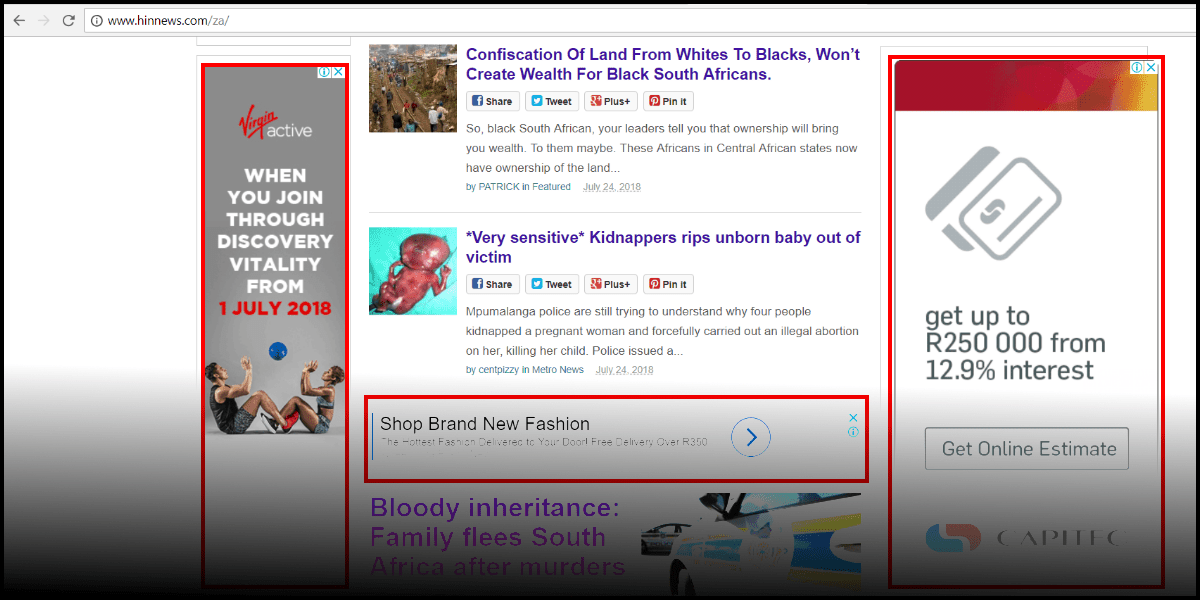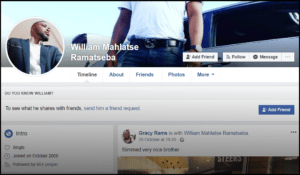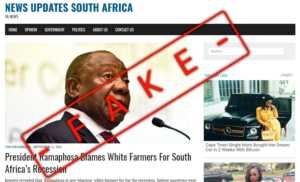Exposed: How corporates are funding fake news

Some of South Africa’s biggest banks, insurance companies and car manufacturers have been caught advertising on fake news websites.
A News24 investigation of three months has found that big brands like Absa, Coronation, Cell C, Capitec, Mercedes Benz, Takealot and OUTsurance, who spend millions of rands promoting and marketing the credibility and integrity of their brands, have indirectly contributed to the fake news industry by buying programmatic advertising that landed up on dodgy websites.
Some of these websites, like HINNews – a Nigeria-based site that publishes a mix of fabricated stories and real news – have run stories about EFF leader Julius Malema dying of listeriosis and a new kidnapping ring “ripping” unborn babies from their mothers.
As the world is grappling with the scourge of fake news in the wake of President Donald Trump’s election in the United States and the support he received from Russian-run fake news operations to target potential Republican voters, South Africa has not been spared from the phenomenon.
“At Africa Check, we’ve seen false news stories stoke retribution, cause panic and misinform people about their health, which can have deadly consequences. It’s a real shame that reputable news brands aid the existence of these outlets, even if inadvertently. The sooner this gap is plugged, the better for society,” says Anim van Wyk, Chief Editor at Africa Check.
Association by Advertising
Ismail Jooma, Head of Strategy at VML South Africa told News24 the creators of disinformation and fake news use rhetoric as a tool to divide.
“‘Disinformation’ websites are the modern era’s galvaniser of marginalised rhetoric, more often than not these websites pursue an agenda of racism, sexism and intolerance. If we had to remove the lens of moral subjectivity, purveyors of fake news aim to disunite at the very least.
A number of fake news sites that specialise in publishing fabricated news about South Africa make money through selling programmatic advertising spots to Google and other service providers.
News24 is publishing the results of our investigation into this phenomenon, including a blacklist of fake news websites, on a dedicated website titled Fake News Exposed.
Websites like HINNews are among several similar sites known for their clickbait headlines and fabricated stories, which are either copied from other online news sources or made up from scratch. Their articles show a fondness for the macabre and racially charged stories and are often widely shared on social media.
Companies whose brands appeared on these websites say they were unaware that they were inadvertently funding fake news and have instead blamed Google for allowing these sites to operate.
Google enables programmatic advertising, which is based on users’ browsing patterns on the internet. Advertising agencies buy adverts on behalf of clients and Google allocates these ads through a platform called Google Adsense, that uses algorithms to place adverts on websites. Website owners are then paid by Google Adsense.
In countries like Macedonia, running fake news websites that publish fabricated stories have become a full-scale industry and source of revenue for unemployed youngsters.
Companies condemn disinformation
Capitec, one of the local brands who’s advertising was found on a fake news website, condemned the phenomenon through their spokesperson Charl Nel. This sentiment was echoed by representatives from OUTsurance and Coronation. The full responses of companies caught on fake news websites by News24 can be found here.
These companies say they were unaware that a part of their advertising spend was finding its way to the owners of fake news site, while Google removed HINNews from its advertising network on September 21 after receiving queries from News24.
Nel said it was difficult for the bank to ascertain which news sites are fake and that it targets a market based on its readership. “We utilise various software for delivery of programmatic ads which are globally recognised (and) which optimises and creates lists as a brand watch. Capitec and our advertising partners also review websites on a monthly basis, however, it is very hard to decipher which websites are not legitimate as we target based on users.”
Nel condemned the use of fake news but repeated that it is hard to determine which sites are real and which are fake. “We are working hard to ensure these sites are blacklisted.”
OUTsurance’s head of client relations, Natasha Kawulesar, also denied the insurer’s knowledge or support of adverts on fake news websites and said the fake news website where it advertised was part of the Google Display Network (GDN), Google’s network of Adsense-approved websites. Google bans pornography, illegal downloads and similar websites from the GDN.
“We do not have the knowledge or capability to handle this function [digital advertising] ourselves and currently rely on our media and technology partners to handle this on their side,” said Kawulesar. “We place our trust in the publishers and media partners we deal with. We also have service level agreements in place to protect our brand and reputation. We confirm once again that we do not condone fake news or misinformation in any way, form or scale.”
Thato Mntambo, Manager: Corporate Communications at Mercedes-Benz South Africa also told News24 that the placement of their adverts was in the hands of Google.
“The unintended consequence of the pervasiveness of GDN [Google Display Network] is the difficulty to monitor the number of websites where our advertisements are displayed. We are conscious of the potential of incorrect placements and ameliorate the effects thereof through continuous monitoring of keywords and, in some cases, blacklisting keywords.”
Coronation Fund Managers, responding through their representative Tanya Schreuder of Dentsu Aegis Network, told News24 that the website on which their branding was found formed part of Google’s GDN list of websites.
“Under no circumstances would the Dentsu Aegis Network, as custodians of our clients’ brands, consciously support sites which are illegal, undesirable or dubious in any form. We take brand safety incredibly seriously and on behalf of all of our clients we undertake every effort to ensure that any online inventory we deploy is legitimate and of a quality that is contextually suitable.”
Google’s response
Google declined to comment on HINNews’s listing on the Google Display Network.
A spokesperson said: “Our publisher policies govern where Google ads may be placed. We don’t comment on individual sites but we enforce these policies vigorously and regularly review sites to ensure compliance. We also encourage people to let us know when they see sites that they have concerns about that may be in violation of our policies. More broadly, we’re deeply committed to ensuring quality news and information online – that’s why we’re constantly improving Search to connect users to results from authoritative sources, why we’re building a stronger future for news through the Google News Initiative and why we’re cutting off revenue to sites that violate our ads policies.”




